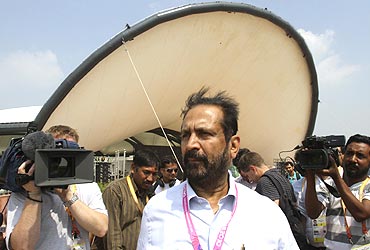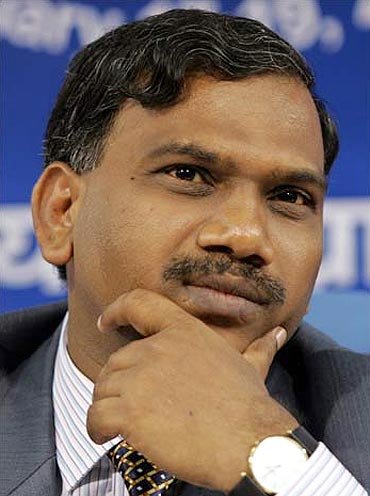Photographs: Jason Reed/Reuters T P Sreenivasan
No amount of spinning will get the glory back. Nor can spectacular show of Indian dances or glossy publications suffice to change our image, says former ambassador T P Sreenivasan.
Gone are the days when diplomats could lie abroad for their country. Images of leaking toilets and pug marks of dogs on mattresses in the Games village were flashed on the BBC long before the people of India realised the extent of the looting of public money in the name of the Commonwealth.
Most people in the world, who followed the trends in the Indian economy, knew that the government was deprived of much of its revenue by the way the 2G spectrum licences were gifted away to powerful corporations.
The foreign press is writing feverishly on the complicity of media icons in wheeling dealing even when tainted journalists continue to call for the blood of erring politicians, as though they still have the moral authority of a free press.
India's image builders may work overtime, but how would they cope with India's dwindling soft power?
India lives from crisis to crisis. The intensity of a new crisis diminishes the gravity of the previous one. Corruption involving Rs 70,000 crore (Rs 700 billion) appears small compared to Rs 160,000 crore (Rs 1,600 billion). So we have no time to evaluate the damage done by each crisis to India's image in the world.
The dazzle of a new achievement blinds us to the insult of past failures.
But the fact is that every demolition of India is not undone by a handful of gold medals or declaration by the US president of India's emergence on the world scene. The cumulative effect of faults and failures remain alive in the eyes of the world even as we move along for another spectacular moon shot or a gold hunt.
The enduring images of the demolished mosque, the collapsing bridge in the Games village and the recordings of suspicious conversations by journalists cannot be erased or wished away.
Please click on the Next button to read what Ambassador Sreenivasan says about the state of India today.
Nexus between politicians and contractors rules Delhi
Image: For most Indians, Commonwealth Organising Committee Chairman Suresh Kalmadi symbolised everything that was wrong with the eventPhotographs: B Mathur/Reuters
India responded to the outcry in the UN General Assembly hall with a categorical assurance that the mosque will be rebuilt where it stood. That assurance resounded in the world capitals, which sought to censure India for obscurantism. It remains recorded in six languages in the archives on First Avenue.
Civility in international relations does not permit constant reminders about undertakings by mature nations. Secularism and tolerance are the hallmarks of India's soft power and we should do nothing to lose them.
India of the cell phones and laptops will not tally with Indians willing to spill blood for the sake of bricks and mortar, however sacred to the faithful.
The world at large will not be interested in who wins and who loses. Only peace in Ayodhya can win us laurels.
The Commonwealth Games scandals were deja vu for Lutyens, the builder of the grand viceregal palace in New Delhi. 'The Indian never finishes anything,' he writes, 'and breaks 50 percent of what he temporarily fixes so that the amount of making good shall be at least 25 percent of the work done and at the cost of another 25 percent there is not near enough skilled supervision.'
Even in March 1927, a brick had fallen from the ceiling of the newly completed legislative chamber. The Commonwealth Games have exposed the nexus between politicians and contractors, which rules Delhi today.
The images of Mira Nair's Monsoon Wedding came back to life when the world saw the sickening hurry to finish in seven days what was not done in seven years. Scepticism and apprehensions preceded other major sports events also, but no one expected India to be so totally unprepared just a month before the event.
Reports of corruption did not shock anyone because they are par for the course in India. It was the inefficiency and glaringly inadequate preparations that bewildered the world. Still, the global media was less critical of the organisers than our own fourth estate.
The facts that emerged were stranger than fiction. More than the collapse of a bridge or a ceiling, the defence of our lower standards of hygiene and comfort brought greater disrepute to us.
The corruption and inefficiency exposed by the poor preparations for the Games will plague us for long. Safe and uneventful games or a handful of medals will not erase the images of filth on the television screens. They will haunt us every time the marvels of modern India are featured in the incredible India series.
Our spin-masters will be hard at work to undo the damage. India's many attractions will still bring the world to our doors, but the exposed weaknesses of our system will make the negotiations harder in the future.
We need many more successes in various areas before the legacy of the Games leaves India alone.
India's scams have captured the world's imagination
Image: A Raja was sacked as telecom minister; the 2G scam is estimated at Rs 1,760 bnWith some reported cases of corruption in the judiciary, every pillar of Indian democracy shows signs of decay that may bring the house down.
We have complained in the past that ours is a mature democracy and that we have not been given credit for it. Today, we should be embarrassed if the outside world compliments us on our democracy.
The scams of India, massive by any standard, have captured the imagination of the world, much to the disadvantage of India. This is the reason why South Block is busy pulling up envoys for insults hurled at India rather than courting them to enhance relationships.
In no other time in history have Indians been insulted in this way.
The image of India demolished by the scams will take time to rebuild itself. No amount of spinning will get the glory back. Nor can spectacular show of Indian dances or glossy publications suffice to change our image.
We have to change ourselves. We should be more tolerant, less corrupt and more efficient. The role models of India must replace the tainted images of recent weeks.
The ministry of external affairs and our missions abroad are often criticised for not projecting the right image of the nation. Our public relations experts must be making their game plan to meet the new challenge.
We may project our soft power and smart power with gusto, but money power dominates the image of India abroad today.




article